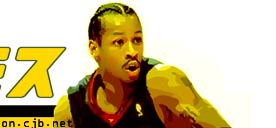





| Taking the rap |
|---|
|
Allen Iverson will hardly have laced up his Reeboks when his expletive-laden thug rap "40 Bars" hits the fan next week. "This is going to be a problem," says the Sixers' Pat Croce.
In a minute, Allen Iverson will come bounding into the control room of a Philadelphia recording studio wearing a giant diamond-and-platinum crucifix around his neck and a $12 million smile on his face, ready to talk. His topic: "How I Spent My Summer Vacation," or, more specifically, "How I Cut Some More Tracks on My First Hard-Core Rap CD." The public's opportunity to preview the fruits of his labor will come Oct. 10, when an edited version of the Sixer superstar's expletive-riddled thug rap "40 Bars" is released to radio. The full album, tentatively titled Non-Fiction, is expected out in February. Before his interview, Iverson just needs to finish one more take. Live on the mike in an adjacent room, the combative 25-year-old guard spits a fierce parental warning over an ominous bass line: "This ain't for kids with action figures, this is for the hard-core niggas." Oh, man. Like Allen Iverson needs more controversy. "I know the chances I'm taking," declares Iverson, who says he's prepared for the blow-up a superstar athlete trafficking in violent hip-hop imagery is sure to ignite. "The media are going to tear my ass up, just like they've been doing since I got into the league." He doesn't even mention that the track his record label has planned to introduce him as a rapper is also misogynistic, homophobic and punctuated by gunshots. The lean 6-footer has plopped himself on a couch in front of a table cluttered with an empty pizza box and half-full bottles of Corona. Around him are his Non-Fiction collaborators, Cru Thik, old friends from the Hampton and Newport News, Va., area where he grew up. Hip-hop has never not been a part of Iverson's life, and he takes pains to put across just how important it is to him to succeed in an arena where other ballers, such as Shaquille O'Neal and Kobe Bryant, have failed. "I don't want people to think I'm doing this just to do it," says the all-star shooting guard, who is about to enter the second season of a seven-year, $84 million contract with the Sixers, who attempted to trade him this summer. (He's "not bitter," Iverson says.) "It's something that I really, really, genuinely want to do and always dreamed about doing. I always dreamed about playing in front of 20,000, and I always dreamed of rapping in front of 20,000." Iverson expects a firestorm when Non-Fiction hits in February, timed to coincide with the NBA's All-Star Weekend in Sacramento, Calif. "But I know how to deal with it better than I did when I was younger," says the man who refers to himself in his raps as Jewelz, a tribute to Samuel L. Jackson's contract killer in Pulp Fiction. "I've been criticized for a bunch of [things] since I was 17," he said. "I went to jail when I was 18 years old." (Iverson served four months for his participation in a 1993 racial brawl at a Hampton bowling alley, an incident in which only the black kids were arrested. His conviction was overturned on appeal.) "I've heard about people saying I ain't . . . never gonna be [anything], that all these guys are going to pull me down. Now we've got a chance to throw it all back in their faces." Contacted last week to discuss Iverson's fledgling recording career, Sixers president Pat Croce had only encouragement for his star. "I don't think it's a bad distraction," he said. "I'd rather have him going into a studio than being out in a club partying all the time." Then Croce was read the lyrics to what Universal Music, Iverson's label, calls "the dirty version" of "40 Bars." Lines such as "man enough to pull a gun, be man enough to squeeze it," and "come to me with faggot tendencies, you be sleeping where the maggots be" rendered the normally ebullient Sixers chief silent. "Oh, now what?" Croce responded, wearily. "That doesn't sound too positive to me. This is going to be a problem. . . . But you know what? It's nothing new for four years. I love Allen, but I'm not responsible for what he does. He's a grown man." Iverson defends his lyrics, which, like all of Non-Fiction's rhymes, he says he wrote. The song will go to radio stations in a cleaned-up version that Universal hopes will be played by late-night DJs. If the cut makes the album, the label says it will likely be the unexpurgated take. Based on early tracks, Non-Fiction, which is still being recorded, is likely to appeal to fans of DMX and the Notorious B.I.G. "It's about life. Period. . . . I still deal with every aspect of it: the sex, the violence, the drugs, all that. . . . It's never going to go nowhere. And if it does start to fade away, I still won't forget it. I know where . . . I come from, I know what I've been through. . . . "I still got anger," says Iverson, who is wearing a doo-rag covered with images of $20 bills. "And rather than going in the club and shooting everybody . . . I'm going to let it out on wax. People I don't [like], I'm going to tell you about it on wax instead." Non-Fiction is aiming for hip-hop's hard-core audience, fans of all colors, urban and suburban, who have made million-sellers out of Jay-Z, DMX and the Notorious B.I.G. Ultra-violent, misogynistic and, increasingly, gay-bashing lyrics are almost a prerequisite of hard-core rap. An MC's acceptance is based on his or her ability to flow, that is, to rhyme skillfully with originality and style. By sending "40 Bars" to radio and clubs so far in advance of the album, Universal hopes to create buzz about Iverson's skills. The Sixer - whose team reports to training camp this week - is no threat to Jay-Z, but he's very good for a jock. The choice of such a potentially controversial cut is an act of pure marketing. It's a "real 'street' record," says Charles Suitt, head of Crazy World Entertainment, who signed Iverson. It's intended to give Iverson credibility, a declaration that "says 'I can really rhyme, I know how to pick a hot beat . . . and I'm going to flow about whatever I want to flow about,' " says Suitt. Iverson says that the scenarios in Non-Fiction are "like a movie." When he raps "This type of murder don't need no hook," the slaying he refers to is musical - it's about Jewelz, his alter ego, vanquishing all rival MCs. (Universal, which provided The Inquirer a copy of "40 Bars" after Iverson was interviewed, declined comment on the song's lyrics. Nor did the label make Iverson available to discuss them.) "I'm not trying to provoke nobody or go out and hurt nobody or anything," says Iverson. "It's just hip-hop." Besides, he says, Non-Fiction is strictly for adults. "My album is not for kids, at all!" he says emphatically. "If you're under 21, if you're under 18 years old, it's not for you. . . . I'll put it right on the album if that's what they want." The father of two preschoolers isn't convinced that violent lyrics lead to actual violence, anyway: "If your kid goes out and blows somebody's head off because Allen Iverson has said he was going to blow somebody's head off on wax, then you're doing a bad job as a parent." Pat Croce, who has two college-age children of his own, sees things differently: Iverson "may not intend [his CD] to be for kids, but you know kids are going to pick it up. . . . "It's like when Charles Barkley says, 'I'm not a role model.' Well, Allen is a role model for kids that idolize him, and he has the power to affect them with how he acts and what he sings or raps. "He always talks about being 'real,' " says Croce. "He doesn't ever want to leave his roots behind. He doesn't ever want to change or let his homies down. That's so important to him, and that's honorable. . . . But I just think they bring him down at times, and he doesn't see that." Not surprising, Iverson's allegiance to his roots plays a lot differently inside the Studio, the Seventh Street facility where he has been recording. Constant companions include childhood friends such as Randolph "Plex" Billups, who has produced every track on Non-Fiction, and Rashaan Langford and Eric Jackson, who perform as the rap duo Mad Rugged. "It's about the family first," says Billups, referring to both Iverson's blood relatives and his Cru Thik hip-hop clique. As he talks, Iverson works at mastering a rhyme that includes a boast about his diamond jewelry, "Even Aqua Man would drown if my ice'd melt." "That sound OK, Plex?" the rapper asks over the speakers. Billups, whose beats on the dirge-like "40 Bars" are reminiscent of the minor-key minimalism of Swizz Beatz, orders his charge to try again. The producer makes sparing use of samples: "Almost everything I make has an edge. It's not going to be a pop record." Later, Iverson's mother calls, and he tells her that the session is running late and that he loves her. The athlete feels a debt to those he cares about. "I don't feel like being real is picking up a gun to shoot somebody. Or smoking weed, or hanging with your boys all night, or messing around with a bunch of women. That ain't real to me. "Real is taking care of my family. That's what being a real man is to me . . . taking care of your responsibilities. Living, staying alive, and trying to do something positive for yourself and the people around you." Iverson started rapping in grade school. He and his friends "always felt that it was going to be a way out of the ghetto," he says, citing Guru, the Notorious B.I.G. and Redman as his favorite MCs, along with the members of Cru Thik. "I made it out another way, through basketball. But my crew was always running around, trying to get a deal, and it never happened. That's why we cherish this moment so much." The hoopster's fealty to his boys is likely to score points among hip-hop fans. At first, says Crazy World's Suitt, Universal wanted Non-Fiction to be studded with cameos by superstar rappers. Iverson insisted on his people and his locale - most of the album has been recorded in Virginia Beach - as a way to put Newport News ("Bad News," he calls it) on the hip-hop map alongside such hotbeds as "Illadelph." When they delivered, the label liked what it heard. "His realness is an attribute," says Universal's Katina Bynum, who is in charge of marketing Iverson. "The kids identify with him. They don't think he's fake. He's got the tattoos. He looks like a rap star; he acts like a rap star." Bynum said Universal planned to launch the album with a major campaign that would include everything from ads in rap magazines to buying time on sports-talk radio. The first targets will be Philadelphia and Virginia. "He's going to have to wake a few people up," said Bonsu Thompson, music editor of the hip-hop magazine XXL, who said the one time he heard Iverson, "he surprised me, he sounded pretty good. . . . People are automatically sleeping on him because of what Kobe and Shaq did." (O'Neal's 1993 album, Shaq Diesel, sold nearly a million copies, but 1998's Respect topped out at 105,000. Bryant's single "K.O.B.E." was a bust earlier this year, and a planned album was scrapped.) Should Non-Fiction break through to a wider MTV audience, Iverson's commercial potential is enormous. "When kids hear [Non-Fiction], their heads are going to explode," predicts Henry "Que" Gaskins, an Iverson adviser and former general manager of Reebok's Iverson brand, from which the guard earns $4 million to $6 million a year. " 'We get Tupac and Mike [Michael Jordan] rolled into one? He plays ball, and talks about the life we're living?' It could be huge." But Iverson could alienate longtime supporters - not to mention corporate suitors - who could get behind his hip-hop image as long as he wasn't spouting rhymes with the potential to cause a John Rocker-size uproar. "It's a fine line he's walking," says Gaskins, who thinks Iverson will "get strafed in some quarters, but still come out looking good. The [National Basketball Association] isn't going to like it, sports journalists who don't listen to the Hot Boyz aren't going to get it at all. . . ." But Non-Fiction will take Iverson "full circle as the most complete icon of the hip-hop nation," he predicts. "And if there's a controversy, it's only going to help record sales. That's what drove Eminem over seven million." Non-Fiction is also a potential Molotov cocktail tossed into Iverson's relationship with coach Larry Brown, who has frequently criticized him for perennial tardiness and distracting the team with his off-court behavior. "I don't play basketball 24 hours a day," says Iverson, who lives in suburban Philadelphia with his fiancee, Tawanna Turner; daughter, Tiaura, 5; and 2-year-old son, Allen 2d. "Just because I'm in one profession doesn't mean it's going to stop me from being in another profession if it's something that I want to do. You only live once. . . ." He gets testy when the subject turns to Brown. "I respect him as a coach, and that's as far as I take that. . . . I don't have to be his friend or anything, but . . . I want to see him smile. I want to see how he looks holding up a championship trophy with champagne poured on his head. That don't mean I'm going to pour it on him." Iverson says the main thing he brings from basketball to rap is "my heart." "And just like I think I'm the best basketball player in the world, I think I'm the best MC, too. I have to. I don't [think] my album needs to be better than Shaq's or my album needs to be better than Kobe's. Nah, my album has to be better than everybody's." |

|
|---|
| Author |
| Dan DeLuca |
| Source |
| Inquirer |
| Return to Articles |